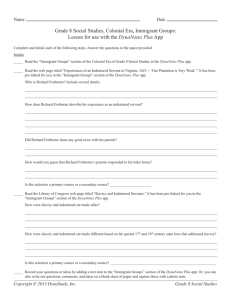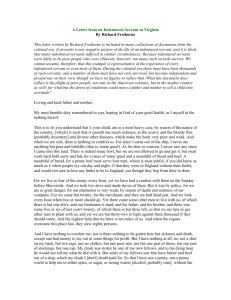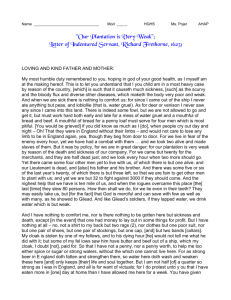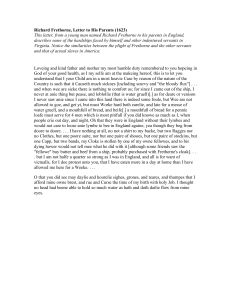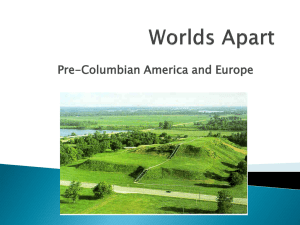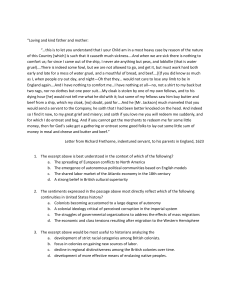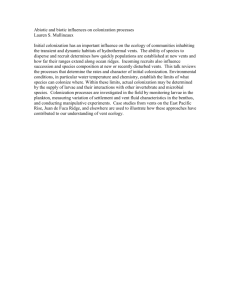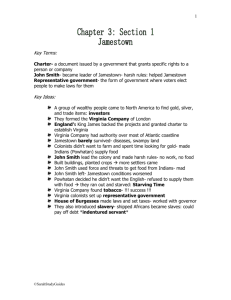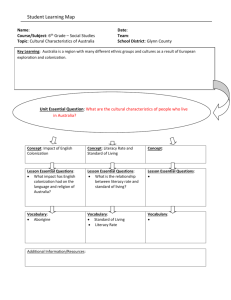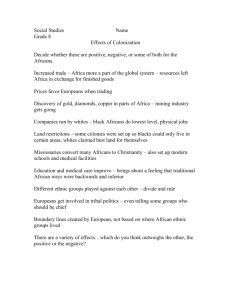A Letter Home: The Reasons for and Realities of Colonial Life
advertisement
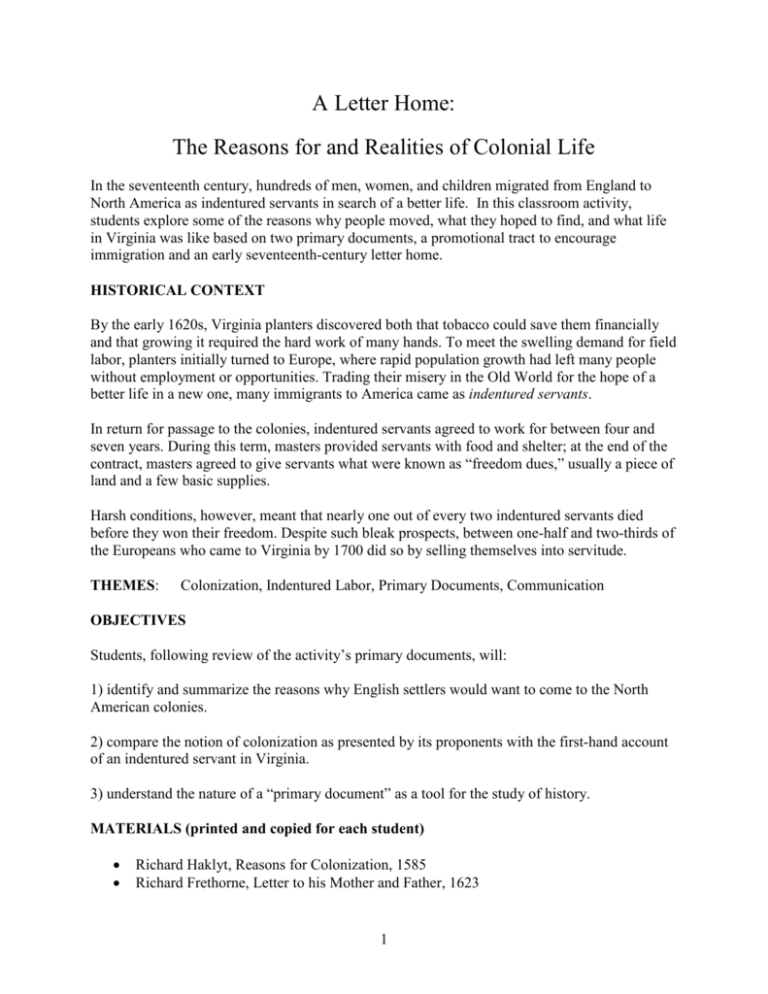
A Letter Home: The Reasons for and Realities of Colonial Life In the seventeenth century, hundreds of men, women, and children migrated from England to North America as indentured servants in search of a better life. In this classroom activity, students explore some of the reasons why people moved, what they hoped to find, and what life in Virginia was like based on two primary documents, a promotional tract to encourage immigration and an early seventeenth-century letter home. HISTORICAL COTEXT By the early 1620s, Virginia planters discovered both that tobacco could save them financially and that growing it required the hard work of many hands. To meet the swelling demand for field labor, planters initially turned to Europe, where rapid population growth had left many people without employment or opportunities. Trading their misery in the Old World for the hope of a better life in a new one, many immigrants to America came as indentured servants. In return for passage to the colonies, indentured servants agreed to work for between four and seven years. During this term, masters provided servants with food and shelter; at the end of the contract, masters agreed to give servants what were known as “freedom dues,” usually a piece of land and a few basic supplies. Harsh conditions, however, meant that nearly one out of every two indentured servants died before they won their freedom. Despite such bleak prospects, between one-half and two-thirds of the Europeans who came to Virginia by 1700 did so by selling themselves into servitude. THEMES: Colonization, Indentured Labor, Primary Documents, Communication OBJECTIVES Students, following review of the activity’s primary documents, will: 1) identify and summarize the reasons why English settlers would want to come to the North American colonies. 2) compare the notion of colonization as presented by its proponents with the first-hand account of an indentured servant in Virginia. 3) understand the nature of a “primary document” as a tool for the study of history. MATERIALS (printed and copied for each student) • • Richard Haklyt, Reasons for Colonization, 1585 Richard Frethorne, Letter to his Mother and Father, 1623 1 ACTIVITY: COMPARIG DIFFERET POITS OF VIEW Part 1: Introduction (5 min.): Distribute Richard Hakluyt’s description of Virginia and Frethorne’s letter before or at the beginning of class; give students the opportunity to read through both and then introduce the following definition of “primary document” and the authors of the two documents they are considering (you may want to divide students into small groups to read through the documents). Historians use a wide variety of sources to answer questions about the past including both primary sources and secondary sources. Primary sources are actual records that have survived from the past, such as letters, photographs or articles of clothing. Secondary sources are accounts of the past created by people writing about events some time after they happened. This activity asks students to compare two different primary documents about the same place—the first was a promotional pamphlet designed to encourage immigration, while the second was written by a teenaged boy who had moved to Virginia to his parents back in England. Encourage students to think about the biases of different kinds of sources: • • • How do sources compare? What are the potential biases of different kinds of sources? Which do students think is more reliable and why? Few historical texts seem as familiar – or as compelling to read – as personal letters. They are plain-spoken, lively, and full of details and seem to emerge directly from the writer, fresh and intimate, bringing us close to who that person was. At the same time, letters reveal differences between times past and our own time. They make us curious to explore differences in language and expressive styles, in what people felt needed saying and what did not. Advertisements, on the other hand, usually have a specific agenda—their role is to “sell” the reader on an idea or an object. Though they are intended to grab a reader’s interest, they are rarely written for one person in particular. Overall, then, letters and advertisements both represent specific points of view—either that of the author or the company he works for. Richard Hakluyt the Elder was part of a family that promoted English settlement of North America during the sixteenth century. His pamphlet about Britain’s Virginia colony contains almost three dozen reasons supporting colonization of the continent. The Jamestown colony, however, suffered a casualty rate of almost 80% in the first half of its second decade as a colony. The letter of indentured servant Richard Frethorne, written in 1623, details the realities of life in the Jamestown settlement. Since both texts retain the language of their respective authors, students should be made aware that sentence structure and spelling have changed in the English language since the sixteenth and seventeenth centuries. If you are working with younger readers, you may choose to use the “adapted” versions of these documents which simplify language and spelling. 2 Part 2: Analyzing the Documents (15 min.) Write on the blackboard the heading “Reasons Why Colonists Settled the New World.” Based on the readings from Hakluyt and Frethorne, have students identify at least ten to twelve reasons for colonization. Now draw a two-column chart titled “Colonization.” The left-hand column should read “Reasons” and the right hand column should read “Realities.” Ask students to think about their documents again and compare the “Reasons” given to encourage colonization with the “Reality” of life in Virginia itself ( to match them, in other words, as pairs). Not all of Hakluyt’s reasons have a corresponding “reality” in Frethorne’s letter but there should be enough contrasts to begin discussing why these two sources might have different points of view. Have students consider the following possible factors that shaped what each author chose to write: • • • • • Why was the author writing? Who was the author’s audience? When was the author writing? Do the dates matter? Had the author been to Virginia? Does the form of the source (a letter or advertisement) matter? Part 3: Applying the Lesson (15 min.) Have students imagine themselves as colonists who came to the colonies. They could come for a variety of reasons: religious freedom, economic opportunity, meeting with family, etc. Have them write a letter back home telling how their lives have changed since their arrival. These letters should either try to convince family members to join them in the colonies, or warn family members to stay home (this could be a take-home activity is there is not enough time in class). Part 4: Other Options or Follow-up Activities Option 1 Have students develop an advertising poster using information from the teacher’s presentation and their textbook or other readings about why people colonized the United States. This advertisement could include any combination of factors and should try to entice people to join the colonization efforts. Option 2 Encourage students to talk to family members about what they know about relatives who immigrated to the US; have them investigate their relatives’ motivations. Have students complete a family tree using the flags of family members’ countries-of-origin as the “leaves” on the tree. 3 Option 3 Write a letter or an entry in a diary as if you were sailing to a new home in the American colonies. What are you feeling? What do you miss? What are you eating/wearing? What do you hope your new home is like? ___________________________________________________________ Credits and Resources: This lesson plan combines ideas from activities originally developed by EDSITEment (http://edsitement.neh.gov), an educational resource funded by the National Endowment for the Humanities and “Colonial House,” a PBS-series on life in early America (http://www.pbs.org/wnet/colonialhouse/teachers/plan4b.html). For more information about life in early North America, see Lorena Walsh and Lois Green Carr, Robert Cole’s World: Agriculture and Society in Early America (University of North Carolina Press, 1991). For further resources on early journal writing, see the lesson plans of “Discovering Jamestown,” An Electronic Classroom Adventure for Teachers and Students (http://www.whro.org/jamestown2007/index.html). 4 Richard Hakluyt, Reasons for Colonization, 1585 The glory of God by planting of religion among those infidels. The increase of the force of the Christians. The possibility of the enlarging of the dominions of the Queen's Most Excellent Majesty, and consequently of her honour, revenues, and of her power by this enterprise. An ample vent in time to come of the woollen cloths of England, especially those of the coarsest sorts, to the maintenance of our poor, that else starve or become burdensome to the realm; and vent also of sundry our commodities upon the tract of that firm land, and possibly in other regions from the northern side of that main… By return thence, this realm shall receive…most or all the commodities that we receive from the best parts of Europe, and we shall receive the same better cheap than now we receive them, as we may use the matter. Receiving the same thence, the navy, the human strength of this realm, our merchants and their goods, shall not be subject to arrest of ancient enemies and doubtful friends as of late years they have been. If our nation do not make any conquest there but only use traffic and change of commodities, yet, by means the country is not very mighty but divided into petty kingdoms, they shall not dare to offer us any great annoy but such as we may easily revenge with sufficient chastisement to the unarmed people there… The great plenty of buff hides and of many other sundry kinds of hides there now presently to be had, the trade of whale and seal fishing and of divers other fishings in the great rivers, great bays, and seas there, shall presently defray the charge in good part or in all of the first enterprise… The great broad rivers of that main that we are to enter into, so many leagues navigable or portable into the mainland, lying so long a tract with so excellent and so fertile a soil on both sides, do seem to promise all things that the life of man doth require and whatsoever men may wish that are to plant upon the same or to traffic in the same… If we find the country populous and desirous to expel us and injuriously to offend us, that seek but just and lawful traffic, then, by reason that we are lords of navigation and they not so, we are the better able to defend ourselves by reason of those great rivers and to annoy them in many places… The known abundance of fresh fish in the rivers, and the known plenty of fish on the seacoast there, may assure us of sufficient victual in spite of the people, if we will use salt and industry. The known plenty and variety of flesh of divers kinds of beasts at land there may seem to say to us that we may cheaply victual our navies to England for our returns… 5 The navigating of the seas in the voyage, and of the great rivers there, will breed many mariners for service and maintain much navigation… Since great waste woods be there of oak, cedar, pine, walnuts, and sundry other sorts, many of our waste people may be employed in making of ships, hoys, busses, and boats, and in making of rosin, pitch, and tar… If mines of white or grey marble, jet, or other rich stone be found there, our idle people may be employed in the mines of the same and in preparing the same to shape, and, so shaped, they may be carried into this realm as good ballast for our ships and after serve for noble buildings… …Moreover, we shall not only receive many precious commodities besides from thence, but also shall in time find ample vent of the labour of our poor people at home, by sale of hats, bonnets, knives, fish-hooks, copper kettles, beads, looking-glasses, bugles, and a thousand kinds of other wrought wares that in short time may be brought in use among the people of that country, to the great relief of the multitude of our poor people and to the wonderful enriching of this realm. And in time, such league and intercourse may arise between our stapling seats there, and other reports of our Northern America, and of the islands of the same, that incredible things, and by few as yet dreamed of, may speedily follow, tending to the impeachment of our mighty enemies and to the common good of this noble government. 6 Richard Hakluyt, Reasons for Colonization, 1585 (modern translation) To convert people to Christianity. To spread the Christian religion. The make the British Queen’s empire larger and by doing so to increase her honor, profit, and power. To create new markets for British goods such as woolen clothe, which would help to create more money to support Britain’s poor. To control more land and be able to grow or find goods that we currently trade to other European countries for; this would help to make Britain more self-sufficient. By reducing the amount of trade Britain has with other countries, we will also reduce the possibility of armed conflict or war at sea and thus create a safer environment for our navy and merchants. If we do not make war with the people we find in America, but only seek to trade with them, and if the people in America are divided into small kingdoms we will be able to control them easily. The natural wealth of the Americas—hides, whale and seal fishing, other kinds of fish in great rivers, bays, and seas—will provide enough profit to help to pay the expenses of colonization. The rivers of America are broad and easy to access, and along them have excellent, fertile soil so that we can plant all that we need to succeed and thrive. If we find many people living in the land, we—because we have the right to trade—have the right to fight for what we want and to make them move. We are also stronger and better prepared to fight. The rivers and seacoasts are full of fish, and are also good for harvesting salt. The lands are full of all kinds of animals making it cheap and easy to feed colonists and navy. There are so many seas and rivers that it will be easy to train new mariners and sailors. There is plenty of oak, cedar, pine, walnut, and other kinds of wood that can be used to build houses, boats, and other kinds of ships, as well as tar, pitch and other building materials. If there are mines of marble, jet, or other kinds of stone, unemployed people can become miners and prepare the stone to ship as ballast back to England. 7 Moreover, not only will be find many goods and precious commodities that will enrich Britain, but the colonists will provide new markets for sale of goods that England creates such as hats, bonnets, knives, fish-hooks, copper kettles, beads, looking-glasses, bugles, and a thousand other kind of things which will provide work for the poor who remain at home. The results will benefit both the people who migrate to America and the islands as well as those who remain at home, and our noble government. 8 Richard Frethorne, Letter to his Mother and Father, 1623 LOVING AND KIND FATHER AND MOTHER: My most humble duty remembered to you, hoping in god of your good health, as I myself am at the making hereof. This is to let you understand that I you child am in a most heavy case by reason of the country, [which] is such that it causeth much sic kness, [such] as the scurvy and the bloody flux and diverse other diseases, which maketh the body very poor and weak. And when we are sick there is nothing to comfort us; for since I came out of the ship I never ate anything but peas, and loblollie (that is, water gruel). As for deer or venison I never saw any since I came into this land. There is indeed some fowl, but we are not allowed to go and get it, but must work hard both early and late for a mess of water gruel and a mouthful of bread and beef. A mouthful of bread for a penny loaf must serve for four men which is most pitiful. [You would be grieved] if you did know as much as I [do], when people cry out day and night – Oh! That they were in England without their limbs – and would not care to lose any limb to be in England again, yea, though they beg from door to door. For we live in fear of the enemy every hour, yet we have had a combat with them … and we took two alive and made slaves of them. But it was by policy, for we are in great danger; for our plantation is very weak by reason of the death and sickness of our company. For we came but twenty for the merchants, and they are half dead just; and we look every hour when two more should go. Yet there came some four other men yet to live with us, of which there is but one alive; and our Lieutenant is dead, and [also] his father and his brother. And there was some five or six of the last year’s twenty, of which there is but three left, so that we are fain to get other men to plant with us; and yet we are but 32 to fight against 3000 if they should come. And the nighest help that we have is ten mile of us, and when the rogues overcame this place [the] last [time] they slew 80 persons. How then shall we do, for we lie even in their teeth? They may e asily take us, but [for the fact] that God is merciful and can save with few as well as with many, as he showed to Gilead. And like Gilead’s soldiers, if they lapped water, we drink water which is but weak. And I have nothing to comfort me, nor is there nothing to be gotten here but sickness and death, except [in the event] that one had money to lay out in some things for profit. But I have nothing at all – no, not a shirt to my back but two rags (2), nor clothes but one poor suit, nor but one pair of shoes, but one pair of stockings, but one cap, [and] but two bands [collars]. My cloak is stolen by one of my fellows, and to his dying hour [he] would not tell me what he did with it; but some of my fel lows saw him have butter and beef out of a ship, which my cloak, I doubt [not], paid for. So that I have not a penny, nor a penny worth, to help me too either spice or sugar or strong waters, without the which one cannot live here. For as strong beer in E ngland doth fatten and strengthen them, so water here doth wash and weaken these here [and] only keeps [their] life and soul together. But I am not half [of] a quarter so strong as I was in England, and all is for want of victuals; for I do protest unto y ou that I have eaten more in [one] day at home than I have allowed me here for a week. You have given more than my day’s allowance to a beggar at the door; and if Mr. Jackson had not relieved me, I should be in a poor case. But he like a father and she li ke a loving mother doth still help me. For when we go to Jamestown (that is 10 miles of us) there lie all the ships that come to land, and there they must deliver their goods. And when we went up to town [we would go], as it may 9 be, on Monday at noon, and come there by night, [and] then load the next day by noon, and go home in the afternoon, and unload, and then away again in the night, and [we would] be up about midnight. Then if it rained or blowed never so hard, we must lie in the boat on the water and have nothing but a little brea d. For when we go into the boat we [would] have a loaf allowed to two men, and it is all [we would get] if we stayed there two days, which is hard; and [we] must lie all that while in the boat. But that Goodman Jackson pitied me and made me a cabin to lie in always when I [would] come up, and he would give me some poor jacks [fish] [to take] home with me, which comforted me more than peas or water gruel. Oh, they be very godly folks, and love me very well, and will do anything for me. And he much marvelle d that you would send me a servant to the Company; he saith I had been better knocked on the head. And indeed so I find it now, to my great grief and misery; and [I] saith that if you love me you will redeem me suddenly, for which I do entreat and beg. An d if you cannot get the merchants to redeem me for some little money, then for God’s sake get a gathering or entreat some good folks to lay out some little sum of money in meal and cheese and butter and beef. Any eating meat will yield great profit. Oil a nd vinegar is very good; but, father, there is great loss in leaking. But for God’s sake send beef and cheese and butter, or the more of one sort and none of another. But if you send cheese, it must be very old cheese; and at the cheesemonger’s you may bu y very food cheese for twopence farthing or halfpenny, that will be liked very well. But if you send cheese, you must have a care how you pack it in barrels; and you must put cooper’s chips between every cheese, or else the heat of the hold will rot them. And look whatsoever you send me – be in never so much – look, what[ever] I make of it, I will deal truly with you. I will send it over and beg the profit to redeem me; and if I die before it come, I have entreated Goodman Jackson to send you the worth of it, who hath promised he will. If you send, you must direct your letters to Goodman Jackson, at Jamestown, a gunsmith. (You must set down his freight, because there be more of his name there.) Good father, do not forget me, but have mercy and pity my mis erable case. I know if you did but see me, you would weep to see me; for I have but one suit. (But [though] it is a strange one, it is very well guarded.) Wherefore, for God’s sake, pity me. I pray you to remember my love to all my friends and kindred. I hope all my brothers and sisters are in good health, and as for my part I have set down my resolution that certainly will be; that is, that the answer of this letter will be life or death to me. Therefore, good father, send as soon as you can; and if you send me any thing let this be the mark. ROT RICHARD FRETHORNE, MARTIN’S HUNDRED 10 Richard Frethorne, Letter to his Mother and Father, 1623 (modern translation) Loving and kind father and mother: My most humble duty remembered to you, hoping in God of your good health. This is to let you understand that I, your child, am in a most heavy case because of the nature of the country, which causes much sickness. When we are sick there is nothing to comfort us. Since I came out of the ship, I never ate anything but peas and loblollie (that is, water gruel). As for deer or venison, I never saw any since I came into this land. There is indeed some fowl. But we are not allowed to go and get it. We must work hard both early and late for a mess of water gruel and a mouthful of bread and beef. We live in fear of the enemy every hour; we are but 32 to fight against 3,000 if they should come. And the nearest help that we have is 10 miles from us. When the rogues overcame this place the last time they slew 80 persons. I have nothing to comfort me. I have nothing at all—no, not a shirt to my back but two rags, nor no clothes but one poor suit, nor but one pair of shoes, one pair of stockings, and one cap. My cloak was stolen by one of my own fellows. And to his dying hour, he would not tell me what he did with it. Some of my fellows saw him take butter and beef out of a ship, which my cloak, I doubt not, paid for. I am not a quarter as strong as I was in England, and all is for want of victuals. I tell you that I have eaten more in one day in your home than I have here in a week. You have given more than my day's allowance to a beggar at the door. If you love me you will redeem me suddenly, for which I do entreat and beg, And if you cannot get the merchants to redeem me for some little money, then for God's sake get a gathering or ask some good folks to lay out some little sum of money in meal and cheese and butter and beef. The answer of this letter will be life or death to me. Your loving son, Richard Frethorne Virginia 3rd April, 1623 11
